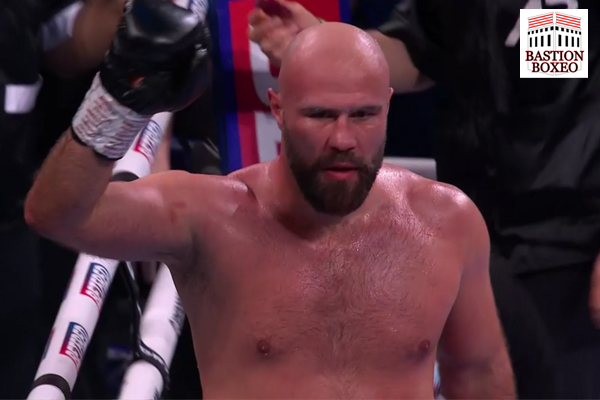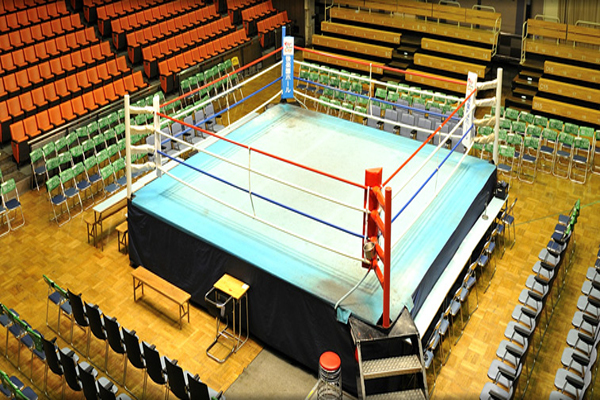Desgraciadamente, la nueva división del peso puente se afianza
Daniel Pi
@BastionBoxeo
Con las innumerables cosas que necesitan mejora o reforma en el boxeo, resulta llamativo que el WBC las haya obviado completamente y que haya dedicado tanto esfuerzo en sacar adelante una iniciativa que los aficionados y los expertos rechazaban como la creación de una 18ª división en el boxeo masculino. En cualquier caso, que el proyecto de una nueva categoría fuese indeseable no significa que fuese inviable, todo lo contrario.
Dado que los promotores y los grandes medios siempre están dispuestos a colgarle a los boxeadores un cinturón, por muy aleatorio que este sea, básicamente para intentar favorecer sus intereses económicos a corto o largo plazo, era de suponer que la categoría del peso puente iba a recibir apoyo de uno u otro lado. Es decir, era inevitable que algunos promotores con boxeadores en torno a unos 100 kg intentasen aprovechar el vacío de poder en la nueva división para tratar de tener en sus escuadras a un “campeón mundial”.
El primer gran impulso que recibió la categoría fue cuando el Groupe Yvon Michel (GYM), poderosa empresa canadiense, organizó el primer mundial de la historia de la división entre Óscar Rivas y Ryan Rozicki y la cadena ESPN compró los derechos para emitir el evento. Este fue un punto de inflexión, puesto que entonces se confirmó que la nueva división ya no iba a tener sólo agentes secundarios implicados, sino que uno de los mayores grupos audiovisuales estaba dispuesto a dar sus millones por televisar peleas en la categoría, lo que iba a suponer que boxeadores de mayor renombre quisiesen también ser parte de ella.
Por lo tanto, siendo el WBC un organismo que tiene mucho prestigio por su pasado y habiendo un mercado prometedor económicamente hablando, la cosa fue a más, habiendo compañías con bastante poder (destacando algunas rusas) que empezaron a pagar por los cinturones menores de la división puente, dando a la categoría boxeadores con cualidades como Evgeny Romanov o Shigabudin Aliev. De todos modos, faltaba un espaldarazo definitivo, el de las grandes promotoras mundiales, algo que se ha producido ya.
Por un lado, Probellum, la mayor compañía emergente de la actualidad y que cuenta con una escuadra de púgiles que se expande casi cada día, se va a implicar en la organización y en la retransmisión de la primera defensa del campeón mundial WBC puente Óscar Rivas, que la realizará el 13 de agosto en Colombia contra el polaco Lukasz Rozanski.
Por otro lado, la todopoderosa Matchroom Boxing ha decidido también participar en la categoría a través del croata Alen Babić, boxeador con enormes brechas que (como no podría lograr un cinturón mundial en el peso pesado) Eddie Hearn ha decidido que siga la ruta del peso puente. Así, Babić combatirá por el título WBC Plata del peso puente contra el polaco Adam Balski, al que se medirá el 21 de mayo, combate que será emitido a todo el mundo a través de DAZN.
Dicho esto, y estando Matchroom y Probellum dispuestas a usar también sus enormes recursos para perjudicar al boxeo con tal de sacar más beneficios y adquirir un poco más de capacidad de maniobra, parece que el peso puente se ha afianzado de forma definitiva y que desgraciadamente ya no hay vuelta atrás. Al contrario, parece cuestión de tiempo hasta que otros grandes promotores también sitúen algunas de las piezas de su ajedrez en la división y con ello arrastren también a los otros tres organismos, que sin duda no querrán perder la oportunidad de quedarse con un trozo del pastel poniendo su sello a peleas titulares.

Unfortunately, the new bridgerweight division takes hold
Daniel Pi
@BastionBoxing
With the countless things that need improvement in boxing, it is striking that the WBC has completely ignored them and has dedicated so much effort to carry out an initiative that fans and experts rejected as the creation of an 18th division in male boxing. In any case, the fact that the project of a new category was undesirable does not mean that it was unfeasible, on the contrary.
As promoters and the big media are always willing to hang a belt to boxers, no matter how random it may be, basically due to short or long term economic interests, it was to be assumed that the bridgerweight was going to receive support from one side or another. In other words, it was inevitable that some promoters with boxers around 100 kg (220 lb) would try to take advantage of the power vacuum in new division to try to have a «world champion» in their stables.
The first big boost the category received was when the Groupe Yvon Michel (GYM), a powerful Canadian company, organized the first world championship in the history of the division between Óscar Rivas and Ryan Rozicki and ESPN bought the rights to broadcast the event. This was a turning point, since it was then confirmed that the new division was no longer going to have only secondary agents involved, but that one of the largest audiovisual groups was willing to give its millions to televise fights in the division, something that was going to attract boxers of greater renown to be part of it.
Therefore, being the WBC an organization that has a lot of prestige due to its past and existing in the division a promising market economically speaking, things went further, with companies with a lot of power (standing out some Russian ones) that began to pay for the briderweight minor belts, giving to the division boxers with qualities like Evgeny Romanov or Shigabudin Aliev. In any case, something was still missing, the biggest promoters in the world, that now have ended taking part in the division too.
On the one hand, Probellum, the largest emerging boxing company, which has a boxing stable that expands almost every day, will be involved in the organization and broadcast of the first defense of the WBC bridgerweight champion Óscar Rivas, which will take place on August 13 in Colombia against the Pole Lukasz Rozanski.
On the other hand, the almighty Matchroom Boxing has also decided to participate in the division through the Croatian Alen Babić, a boxer with huge flaws for whom (since he can’t win a world heavyweight belt) Eddie Hearn has chosen the brigerweight route. Thus, Babić will fight for the WBC Silver bridgeweight title against the Pole Adam Balski, fight that will take place on May 21 broadcasted worldwide through DAZN.
That said, and with Matchroom and Probellum also willing to use their enormous resources too to harm boxing in order to get more profit and acquire a little more maneuverability, it seems that the bridgeweight has definitively established itself and that unfortunately it is no way back. On the contrary, it seems like a matter of time until other big promoters also place some of their chess pieces in the division and thereby also drag the other three organizations, which will undoubtedly not want to miss the opportunity to get a piece of the cake sanctioning title fights.










